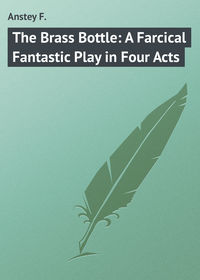
"He hasn't developed them!" declared Edna. "It's false! Ruprecht, deny it! Tell them you are no Ogre!"
"Really, ma'am," said the Duchess to Queen Selina, "I must ask your permission to leave the table. I don't feel as if I ought to be present at a family dispute of this intimate nature."
"Pray don't go, my dear Duchess!" the Queen implored her. "Not till you've heard what the Count has to say."
The Count rose and folded his arms in proud defiance. "I'm not an Ogre," he said sulkily.
"I knew it – I knew it!" cried Edna. "Appearances were against him, that's all!"
"Not an Ogre yet," went on the Count. "But I hope to be one as soon as I get the chance."
"No, no, Ruprecht!" protested Edna. "You don't mean it – you know you don't!"
"What!" said the Count, scowling at her. "Are you going to turn round on me like this, after encouraging me as you did?"
"You will not find it easy to persuade me," said the Duchess, "that the Princess would ever have urged you to become an Ogre."
"Urged him, indeed!" cried Edna wildly. "I had no suspicion – I never said a single word that could possibly – "
"Didn't you say I was to follow the teachings of your great master with the name I never can pronounce?" he demanded. "Didn't you tell me to make my own morality and obey my own instincts, without caring what people thought or what suffering I inflicted? You know you did! And that's all I've done. My instincts told me that those pages were my natural provender. I had a perfect right to take them if I could. The only people who would condemn me would be just those average conventional persons for whom you have such a contempt. I expected better things from you!"
"I cannot sit here another moment," declared the Duchess, rising. "It is making me positively ill!"
"And me!" added Lady Muscombe. "I've been on the point of fainting several times. I must say," she told Clarence, "this is quite the weirdest lunch I ever sat through!"
"We will all leave, Duchess," said the Queen. "I assure you I entirely share your sentiments, and perhaps by this time even Edna – "
"I loathe him, Mother!" she said, shuddering; "I only hope I shall never see his face again!"
"You hear that, sir?" said King Sidney, with more firmness than he usually showed. "And, as the Princess Edna – er – voices the general feeling, perhaps you'll see the propriety of getting out of this at once?"
"It seems to me," said the Count, "that you are all making a great fuss about nothing. If I'd eaten any of your pages I could understand it. But I haven't – I never got the chance."
"Thanks to Clarence!" put in Queen Selina. "He saved the poor boys!"
"It was Miss Heritage, really, Mummy!" corrected Ruby jealously. "She wanted to know about the sack, or I shouldn't have asked."
"Miss Heritage!" muttered Edna. "Ah! I might have known it!"
"Now just you be off to that castle of yours," said the King, addressing the discomfited but quite unrepentant Ogre. "And mind you keep inside it for the future. You will see that he does that, Marshal? I don't want any scandal about this business, but if I have any more trouble from you, I shall be forced – well, to take some very strong measures."
"I'm just going," said the Ogre calmly. "May I have my bag?"
"Confound your impudence, no!" returned the King, "I shall have the beastly thing destroyed."
"Then I think you ought to give me back some of the money I paid for it," said the Ogre. "I bought it from Master Xuriel, and I know you get two-thirds the price of any article he sells. He told me so."
"You – you infamous scoundrel!" cried King Sidney, turning extremely red, perhaps with anger. "Marshal, see this ruffian off the premises – and look here, just send for that rascally astrologer, will you? I'll make short work of him!"
"Farewell, then, to your Majesties," said the Ogre, with a jaunty wave of his big hand. "And farewell to you, Princess Edna. If I have not been as much of a Superman as I could wish, you may still find that I have profited by your teachings."
The old Court Chamberlain's chest gave a loud crack as the Count swaggered out.
"Thank goodness he's gone!" said Queen Selina. "Really, my dear Duchess, and you, dear Lady Muscombe, I simply can't say how distressed I am that anything so unpleasant should have occurred while you were under our roof. I do hope you won't blame me. I always disliked the Count myself – but I should never have dreamed of asking him to meet you if I had known the sort of person he really was!"
"Indeed, Ma'am," said the Duchess, "I can quite believe that."
"And, after all," said Lady Muscombe languidly, "I dare say there are lots of people in town – in houses where they don't keep a page, I mean – who'd be glad enough to get him to come and dine. Society is so much less exclusive than it used to be."
"That," remarked the Duchess, "entirely depends on what you mean by 'Society.' And now, Ma'am," she continued to her hostess, "as the birds – I think you mentioned that they were storks – which brought us here should be rested by this time, I shall be obliged if you will order the car to take me back as soon as I have changed my dress."
"And me, too, if you don't mind," said Lady Muscombe. "I must get home before Nibbles does."
"Oh, but you mustn't leave us so soon!" protested Queen Selina in dismay. "To come all this way for such a miserable little visit!"
"A flying visit, let us call it," said the Duchess. "But, candidly, this country of yours doesn't suit me. I don't feel safe with characters such as Ogres and Giants and Dragons about."
"But I assure your Grace there are very very few – hardly any, in fact!"
"There are more than my nerves can stand," said the Duchess, firmly, and Queen Selina, though deeply mortified by her guests' eagerness to go, found that she could no longer detain them.
The Court Chamberlain and his attendants brought the stork car to the palace door by the time the visitors had resumed their former costumes.
"Good-bye, dear Duchess!" said the Queen. "So charmed to have seen you, even for so short a time. I hope some day you will come again."
"I think it improbable," was the grim reply. "And if you'll allow me to say so, Ma'am, when I do stay anywhere, I prefer a house where I can be sure of the sort of people I am likely to meet."
"I say, Marchioness," cried Clarence, as he joined them on the steps, "you're not really going, are you? I wish you'd stay on a bit. We were getting on thundering well together, you and I!"
"Very sad, isn't it?" she answered, with a charming but slightly mocking grimace. "But Nibbles wouldn't like me to stop here philandering with Fairy Princes – even if they aren't quite the real thing. Good-bye, Ma'am," she added, with a gay little nod, as she stepped into the car, where the Duchess was already seated. "Thanks so much for having me! It's a wonderful house to stay in – and a most interesting experience."
"I have an impression," said the Duchess drowsily, "that I shall wake up presently and find all this has been a dream. I trust so, but, if not, would you mind telling this elderly gentleman to set me down in some unfrequented part —not Stratford Place, where I should attract more attention than is at all desirable."
"That's a good idea, Duchess!" said Lady Muscombe. "He can drop us on Clapham Common, and we can share a taxi home."
Queen Selina kissed her hand affectionately to them both as the storks spread their great wings and the car slowly rose. But her salute was not returned – principally for the reason that both ladies had already closed their eyes in slumber.
"And we might have made those two women our friends for life!" she lamented, as she went indoors. "I hope, Edna, my love, you see now what comes of getting your own way?"
"If I have been mistaken for once," said Edna, in a spiritless tone, "you needn't rub it in, Mother. I can't imagine now what I could ever have seen in that detestable creature."
"Nor I – especially as you could see nothing in Prince Mirliflor, who really was– no, my dear, I'm only speaking for your good. If I was sure you regretted your treatment of him, I might perhaps find some way – "
"I dare say I should act differently if he asked me again. But he won't. This dreadful story is sure to get round to him somehow. Of course I'm glad Ruprecht has been found out in time. But he need not have been exposed so publicly! I do resent that. And you heard what Ruby said? Miss Heritage was at the bottom of it. She deliberately planned this to humiliate me! And if you have the smallest consideration for me, Mother, you will forbid her to appear at Court after this."
"I'm afraid she is a designing young person," admitted the Queen, "and I have thought more than once lately of sending her home to England."
"Then do it, Mother. If you don't, I shall simply refuse to appear in public myself, sooner than meet her."
"She shall go, my dear. I'll see the Court Godmother about it at once. And don't let yourself get too downhearted over the other affair – Prince Mirliflor, I mean. I've great hopes we can put that right."
"I've just left poor darling Edna," she began, as soon as she found the Fairy alone; "all this has been a terrible shock to her, as you may imagine. But it seems I was right in thinking she never really cared for that unspeakable man. He terrified her into accepting him. And, between ourselves, Godmother, I fancy that, if you could induce Prince Mirliflor to come forward again, he would not be sent away a second time."
"So I should imagine, myself," said the Fairy drily. "But, as it happens, owing to the result of my previous efforts, I have lost all influence with Mirliflor. He and I have fallen out."
"But you could easily make it up with him. You might say she was really in love with him from the first, only she wished to put him to the proof – something of that sort. Tell him how delighted we should all be to see him again. There's another little matter I wished to speak to you about. Edna has taken the strongest dislike to that Miss Heritage, who I must say has acted most unwarrantably. I have made up my mind to part with her, and I thought, if you would arrange to have her taken back to England as soon as the car returns to-morrow – "
"Stop," said the Fairy, "I must have time to think over that." She had, it is true, renounced all further interference in anybody's affairs, but habit was too strong for her. Her old brain was busying itself once more with the scheme she had abandoned – a scheme that would certainly not be assisted by Daphne's expulsion from Märchenland. So she temporised.
"Yes," she said at last, "I quite see from what you tell me, that Lady Daphne cannot remain at Court any longer. The difficulty is that I can't send her back to England just yet. My storks will not be fit for so long a flight again for a fortnight at the very least. I'm not going to have them killed on her account. I could do this for you. I could establish her in a little pavilion in a distant part of the palace grounds and keep her there, under my own eyes, till the storks are ready for another journey. It's a very secluded place – almost a wilderness – and none of the Court ever go near it."
"That seems an excellent plan," said the Queen. "But I shouldn't care for them to know that she is a prisoner. They had better be told that she has resigned her situation and left the Palace. And – you won't forget my little hint – about Prince Mirliflor, you know?"
"I will bear it in mind. In fact, if you can spare me for a day or two, I thought of going over to Clairdelune in the dove-chariot to-morrow and having a little chat with him."
"Oh, by all means do!" said the Queen gratefully. "So kind of you to take so much trouble!"
"It's more on his account than yours," replied the Fairy, with a candour that might have been intended as complimentary. "But I don't guarantee that anything will come of it – at all events for a considerable time."
"Indeed I quite understand that – that his wound can hardly be expected to heal just yet."
The Fairy lost no time in conveying Daphne to the secret pavilion without the knowledge of any of the Court. It was quite fit for occupation, and supplied with all that was necessary for comfort; the Court Godmother provided her with an attendant, and even procured some ancient volumes of Märchenland history with which Daphne could beguile her solitude.
That night the Court Godmother summoned up all her energies to send Mirliflor another vision of Daphne. It was the best vision she had ever transmitted, but it was terribly exhausting work, and she grumbled bitterly to herself that the scheme she had in hand should demand these excessive exertions.
But it was one of the good old-fashioned schemes which have always been beloved by romantic but didactic Fairy Godmothers. It would test the characters of Mirliflor and Daphne, and be valuable moral discipline for both, while, if they came through it triumphantly, they would be amply compensated for any temporary inconvenience. She had not engaged in an affair of this kind for at least a century and a quarter, and she was looking forward to a highly interesting and enjoyable experience. First she must regain her influence over Mirliflor, but she thought she would not find much difficulty in doing that.
The Astrologer Royal had been duly summoned before the King to explain his dealings with the Ogre-Count. But he not unwisely preferred to disappear instead, taking with him his books of spells and other apparatus. It was reported that he had found refuge at Drachenstolz.
"Gone there, has he?" said King Sidney to the Marshal. "Better send someone to arrest him."
"It would need an army, sire," said the Marshal, "and a long siege, to enter the Castle."
"Oh, is that so?" said the King. "Well, then, have guards posted all round to see that they don't get out. After all, so long as we keep them boxed up there, they can't do any mischief." And the guards were posted accordingly.
Poor Ruby was almost broken-hearted on hearing from her mother that her beloved Miss Heritage had gone back to England without so much as a word of farewell. The Court received the news with murmurs, and a strong suspicion that she had not left of her own free will.
Clarence was in the deepest dejection. It was true that he had made no advance of late in his pursuit of her, but so long as she remained there had always been hope. Now that she was gone for ever, even his riding and hunting became uninteresting and purposeless. What was the use of excelling in them when she was not there to hear of his prowess?
Early that afternoon he returned from the forest, and, after spending a few minutes in his own apartments, came down to his father's private cabinet with a gloomy and slightly startled expression. He found King Sidney alone and in better spirits than usual.
"Back from your hunting already, my boy?" he said.
"Had enough of it," said Clarence. "Felt a bit off it to-day, somehow."
"Ah, your mother and I are just in from a drive. There's no doubt this – er – rupture with that disgusting fellow has brought about an enormous improvement in the public feeling. We were cheered, my boy, actually cheered!"
"It may be some time before you're cheered again, Guv'nor," said Clarence. "I mean, you made a grand mistake in letting that little perisher Xuriel sell those tables of his 'Under Royal patronage,' and I'm afraid you'll hear of it before long."
"Eh, why, what's wrong with them? They seemed to give perfect satisfaction. Have there been any complaints?"
"There'll be lots if they all go like mine has. When I came in just now I was feeling a bit peckish, so I got out my table. It laid itself right enough, only the wine was stiff with wriggly things like tadpoles – and, when I lifted the dish-cover, I'm hanged if there weren't a couple of great fat snakes under it, hissing like tea-kettles! And I paid the beggar a sack and a half of ducats for that table!"
"Most untradesmanlike!" said King Sidney indignantly. "Of course you can make him return the money! No, you can't, though, I forgot – the fellow's bolted!"
"I wasn't thinking so much of that," said Clarence, "but suppose all the other johnnies who've bought tables find they're wrong 'uns, and want their money back – from us?"
"They wouldn't have a leg to stand on, my boy. It's a clear case of 'Caveat emptor.' But, after all, there's no reason at present to suppose the other tables are – hem – in a similar condition to yours."
"It's to be hoped not," said Clarence. "There'll be the devil's own row if they are."
Unfortunately it soon appeared that they were, and the numerous persons in Eswareinmal who had purchased them felt their grievance so strongly that they sent a large and somewhat turbulent deputation to demand an audience from His Majesty.
King Sidney received them, indeed he could not very well avoid doing so, as they forced their way to his presence. He did his best to reason with them, pointing out the undeniable fact that no guarantee had been given that the tables would last for ever, and that it was scarcely surprising if, after being in constant use, they should begin to show symptoms of wear and tear – a phrase which had the effect of infuriating them almost to madness. Nor were they pacified when he quoted his maxim of "Caveat emptor," and pointed out that, if people would invest in magic tables, some degree of trickery was only to be expected. His arguments were lost on them. They had discovered somehow that the greater part of their purchase money had gone to swell the Royal revenues, and they clamoured for instant restitution.
So finally the King had recourse to his usual expedient. "Don't let us have a row about this little matter, gentlemen," he said. "I'm anxious to meet you if I can, and I tell you what I'll do. I'll have the Council summoned at once. You can lay your claims before them, and if they can see their way to granting you any compensation, we shall be as good friends as ever again."
King Sidney's idea had been that the Council, if they decreed any compensation at all, would do so from funds belonging to the State. It appeared, however, that they did not consider this to be within their powers. They decided that, as the Sovereign had enjoyed the greater part of the profit on the sales of the self-supplying tables, he was bound to refund the money, proportionate deductions being made for the period during which each table had been in proper order. This required elaborate calculations, but the Lord Treasurer had a wonderful head for figures, and worked them out to such effect that there was only moderate grumbling on the part of the creditors, all of whom received rather more than their due, while a good many had never bought a table at all.
So, on the whole, the decision satisfied all except the Royal Family.
"It's easy to be generous with other people's money!" said the King. "But this business has nearly cleared us out. That confounded Treasurer hasn't left us more than a dozen sacks or so to go on with. He's suggested that I might try to get a loan from the King of Goldenbergenland. I'm told he's wealthy, so perhaps he'd be willing to oblige a fellow-monarch, if I gave him the mine as security."
"That mine?" said Clarence. "Why, it doesn't cover its working expenses – and never will, with the wages we pay those miner-johnnies!"
"Most exorbitant," said the King; "I've been thinking of – hem – bringing back those yellow gnomes. They wouldn't want wages – and the mine would be healthier for them than those marshes they're draining."
"It might," agreed Clarence, "if there were any of the poor little beggars left. But I believe the climate has been too much for 'em."
"Has it, though? I'm afraid they must have neglected to take proper precautions. Very ungrateful, after all I've done for them! But it's no use trying to benefit that class of persons. I see that now."
Clarence still wore his pendant, though he rode less and less frequently. The Marshal told him that there was excellent carp-fishing to be had on the Crystal Lake a few miles from Eswareinmal, and he took up this sport, making solitary expeditions to the lake, from which he returned in better spirits for a time. But even this occupation soon palled, and the whole Court were struck by his increasing dejection, which, rightly or wrongly, they attributed to the absence of Lady Daphne.
CHAPTER XV
"RIVEN WITH VAIN ENDEAVOUR"
After a few hours' flight the Fairy Vogelflug's team of doves had safely deposited her at the entrance to the Palace of King Tournesol. She ascertained that Prince Mirliflor was within and went at once to his apartments. He received her with his usual respect, but there was a reserve in his manner which showed that the memory of his late fiasco was still rankling. His reserve increased perceptibly after she had explained the purpose of her visit. He altogether declined to consider a second matrimonial venture on her recommendation, hinting as politely as possible that her idea of a suitable consort for him was too unlikely to correspond with his own. "You mean with the ideal of your visions?" she said. "And you saw her again last night. Now didn't you, Mirliflor?"
"I did," he said; "but how did you know that?"
"How did I know? Because I sent you the vision, of course. I sent you the former one, too, though there were reasons why I couldn't tell you so till now."
"And why do you tantalise me by making me dream of an unattainable perfection?" he asked hotly. "Can you suppose that anything short of it will ever content me now? Since I cannot hope to find so sweet and fair a Princess in all the world, I am only the more resolved to live and die unmarried!"
"She exists, or I could not have shown her to you in a vision. You have only to do exactly as I tell you, Mirliflor, and you shall see her, and win her, if you can."
"You said all that about the other one, Godmother Voldoiseau," he replied. "No, it's no good. I really can't trust you again."
"Don't be obstinate, Mirliflor, or you'll put me in a passion, and that's dangerous at my age. I grant you I was wrong about Princess Edna. But I'm not wrong now. I assure you that, if you saw this girl, you would own that she was no less fair than she appeared in your visions."
"But if there indeed lives so lovely a Princess," he said, "how comes it that I have never heard of her existence?"
"She is no Princess, Mirliflor. Merely a poor friendless girl I have chosen to protect."
"So much the better," he said. "She is the less likely to refuse me."
"Because you are a Prince? Just so – but I don't intend that she shall accept you for any such reason. I shall not allow you to see her at all unless you promise not to reveal your rank, or even your real name, to her until I give you leave to do so."
"You have my word, Godmother," he replied. "After all, it may be that, even without rank or title, I shall succeed in obtaining favour in her eyes."
"You trust to your good looks – but those, too, you must consent to sacrifice. Love that is based on mere outward appearance soon passes. I have to be very careful now how I exercise any magic power whatever – each time it takes more and more out of me, and even sending you these visions taxed me most severely. Still, I will make another effort and change you into a less comely form."
"I suppose you are proposing to turn me into a beast of some kind?" he said. "If so, I cry off. I know it succeeded with an ancestor of ours – but that was centuries ago, and I'm not inclined to undertake the risk myself."
"I'm not asking you to undertake it. The form you would assume would be human, and not in the least repulsive. In strict fairness I ought to transform the girl as well, but as I know very well that, if I did, you would never so much as look at her, I must leave her as she is. Only if you don't consent to be transformed yourself, you will never see her at all."
"But what if I let myself be transformed and find out when I see her that she doesn't resemble my vision?"






